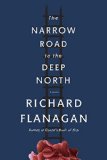Page 1 of 1
There are currently 2 reader reviews for The Narrow Road to the Deep North
Write your own review!
Gilma Chute
The best book in the last 10 years
This book is the one you will read several times in your life. The writer style is deep. It is a book you do not forget.
 Cloggie Downunder
Profoundly moving.
Cloggie Downunder
Profoundly moving.
“There was around him an exhausted emptiness, an impenetrable void cloaked this most famously collegial man, as if he already lived in another place – forever unravelling and refurling a limitless dream or an unceasing nightmare, it was hard to know – from which he would never escape. He was a lighthouse whose light could not be relit”
The Narrow Road to The Deep North is the sixth novel by award-winning Australian author, Richard Flanagan. Despite his humble beginnings in a remote Tasmanian village filled with “verandah-browed wooden cottages”, Dorrigo Evans is clever enough to get scholarships for high school and university. He leaves the locale where he used to “smell the damp bark and drying leaves and watch clans of green and red musk lorikeets chortling far above. He would drink in the birdsong of the wrens and the honeyeaters, the whipcrack call of the jo-wittys…”
By 1940, he is a promising young surgeon, engaged to Ella Lansbury, a girl from the right sort of family, when he joins the army. Stationed near Adelaide while awaiting dispatch overseas, Dorrigo’s chance encounter with his Uncle Keith’s young second wife, Any Mulvaney, results in a liaison he could neither have anticipated nor resisted.
A few years on, Dorrigo Evans is a Prisoner of War, in command of a thousand men charged with building the Burma Railway, where cruelty and death were unwelcome, but commonplace: “They had smoked to keep the dead out of their nostrils, they had joked to keep the dead from preying on their minds, they had eaten to remind themselves they were alive…”
Dorrigo is constantly wracked with feelings of inadequacy, but “He could do this, he told himself… He had no belief he could do it, but others believed he could do it. And if he believed in them believing in him, maybe he could hold onto himself”
The survivors return home to a life that feels alien: “He didn’t fit with his own life anymore, his own life was breaking down, and all that did fit – his job, his family – seemed to be coming apart”. Dorrigo goes through the motions, marries, has three children and “Occasionally, he felt something within him angry and defiant, but he was weary in a way he had never known, and it seemed far easier to allow his life to be arranged by a much broader general will than by his own individual, irrational and no doubt misplaced terrors”
A celebrated surgeon and a war hero, Dorrigo despises the society of which he is part: “He did not believe in virtue. Virtue was vanity dressed up and waiting for applause”. From those who have been there, he sometimes hears words of wisdom: “Adversity brings out the best in us, the podgy War Graves Commission officer sitting next to him had said… It’s the everyday living that does us in”
Using multiple narrators, Flanagan examines the well-known cruelty of the Japanese captors from both sides. He also exposes the staggeringly selfish attitudes of POW officers, the sometimes secretive, sometimes selfish and sometimes extraordinarily generous behaviour of enlisted men, and also the postwar politics of punishment. With descriptive prose that is exquisite, it is no wonder that this novel is a winner of several awards and a nominee for many more. Profoundly moving.
